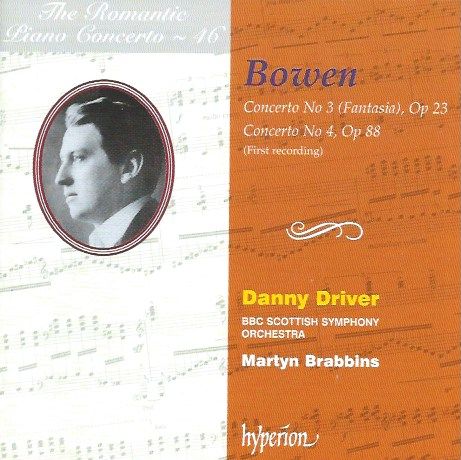York Bowen Piano Concertos

Hyperion's series of recordings The Romantic Piano Concerto is one of the glories of our age. This is volume 46 and presents two concertos by a composer whose name is today known but not well known: York Bowen (1884-1961). Long-lived and prolific, Bowen's music is currently undergoing something of a renaissance, with both Hyperion and Chandos on the case.
Today's review partly comes in response to a new release of some of York Bowen's solo piano music, also on Hyperion and played by Nicolas Namiradze which includes the fabulously inventive Fragments from Hans Christian Anderson. That particular review will appear in the "In Briefs" section of the next International Piano magazine, but part of the research for that review as to re-aquaint myself with these two wonders, the Third and Fourth Concertos in scinitllating performances by Danny Driver, with the BBC Scottish Symphony Orchestra and Martyn Brabbins.
Bowen wrote four piano concertos (the second is also known as "Concertstück," like the third is known as "Fantasia"); there's also a Jig for two pianos and orchestra.
The Third Piano Concerto is also known as "Fantasia" and is a single-movement work that, from a rather swashbuckling opening moves towards more Impressionistic territory (or at the very least towards Saint-Saëns!). There's a heart-on-sleeve aspect to this music that has led to comparisons with Rachmaninov; but the vocabulary is, of course, different. Danny Driver, who most recently has recorded a beautifully musical version of the Ligeti Etudes, is a brilliantly fleet-fingered soloist who fully embraces the grander emotions.
Bowen's Third was premiered at a Prom in 1908; the Fourth Concerto in 1937. The composer Sorabji, who we encountered recently via his Transcendental Studies, called this the greatest piece for piano and orchestra written by an Englishman; a touch enthusiastic perhaps (remember John Ireland's magnificent, taut Piano Concerto was composed in 1930). We don't have a YouTube video of Driver's committed performance of the Fourth, a work on a hugely larger canvas than the Third, but we do have the composer himself in 1938, just after the premiere (there's a lot of surface noise but it is so worth persevering); the conductor is Sir Adrian Boult with the BBC Symphony Orchestra:
Driver and Brabbins offer Hyperion's trademark excellence of sound. Commentators on music have a habit of outlining influences on music that is little-known, which for some is useful; for others, disrespectful. Many have commentated on figures such as Ravel, Rachmaninov (and - here we go - try the very opening for that), Richard Strauss and Stravinsky. The danger is that in "composer spotting" we forget that there is an individual voice at the helm; and Bowen's voice is certainly that. The sheer passion of the slow movement will perhaps surprise many; and Driver and Brabbins are fully committed.
Contrasting this disc with the Namoradze disc reveals identifiably the same composer but we hear two sides of his coin. Both, then, are recommended purchases for those interested in exploring Bowen's output.
